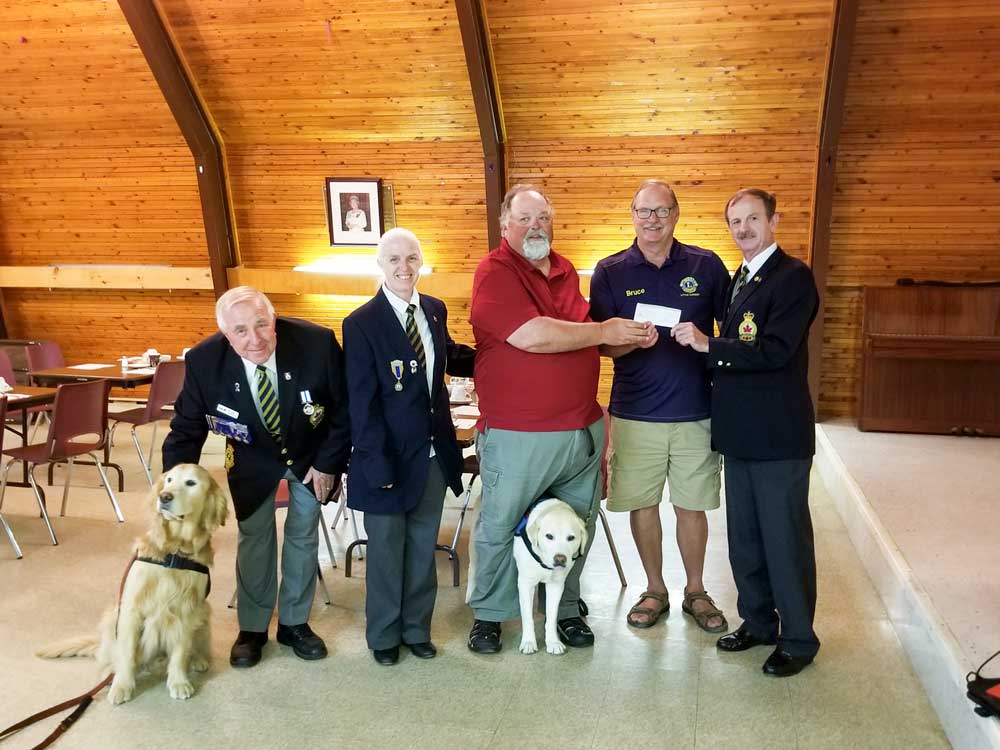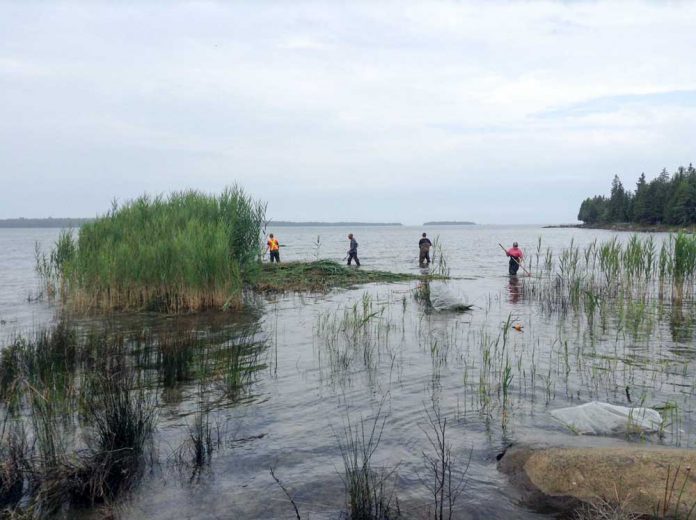Provincial program launched at Little Current Branch #177
LITTLE CURRENT—An innovative fundraising collaboration between the Royal Canadian Legion and Wounded Warriors Canada was launched at the Little Current Branch 177 of the Royal Canadian Legion this past weekend. The program will assist in raising funds for the training of service dogs with veterans and first responders caught up in the throes of post traumatic stress disorder (PTSD).
The highlight of the launch was a keynote speech by RCAF Captain (Rtd.) Medric Cousineau SCCD KStG, himself a PTSD sufferer and the founder of Paws for Thought, a program that pairs service dogs with veterans and first responders to help them manage their symptoms.
In her opening remarks, Algoma-Manitoulin-Kapuskasing MP Carol Hughes thanked Captain (Rtd.) Cousineau for his relentless work in advocating for funding for PTSD dogs, given the positive impact this has proven to have on his life and that of others. Ms. Hughes also thanked the Little Current Legion for being the first to take up and kick off this challenge which will go a long way in assisting military and emergency responders affected by PTSD. She also noted the generosity of the Little Current Lions Club and other organizations alike and said she was impressed by the individual donations made, including that of visitors to the area, some of which were from the US.
Algoma Manitoulin MPP Mike Mantha sent his regrets and Legion public relations officer Roy Eaton shared a letter on the MPP’s behalf. Mr. Mantha noted that the success of the Wounded Warriors Canada program has led to increased demand for PTSD service dogs and that this is why fundraisers like the one taking place at the Legion “are so important to raise awareness, support and funding.”
Mr. Eaton, who hosts the popular VHF radio program Cruisers’ Net broadcast from the Anchor Inn in Little Current, noted that the boating community of the North Channel has come on board with a donation to date of $670. “Our motto is ‘Boaters helping boaters’,” said Mr. Eaton, but he noted that “they help this community. These are people, many of whom don’t even live in this country, who want to help make a difference.” Mr. Eaton added that he was also there on behalf of the Espanola Legion, Branch 139, “who will be sending $250 for the cause.”
Those funds will be added to the $1,500 donation provided by the Little Current Lions Club that was presented by Lion President Bruce Burnett.
Legion Dominion Command First Vice-President (Ontario Command) Garry Pond announced that the Legion has committed to raising $225,000 to assist the PTSD service dog training program. Mr. Pond, a retired sergeant major, noted that the Little Current branch was the first to hold a fundraiser towards attaining that goal.
“This is something Ontario Command is totally excited to be a part of,” said Mr. Pond, noting that the collaboration with Wounded Warriors Canada is a first for the Legion, but something that is fully in keeping with the mandate of the Legion.
Mr. Pond introduced the keynote speaker of the event, Capt. (Rtd.) Medric Cousineau SCCD KStG, a recipient of the Canadian Star of Courage for his part in a helicopter borne dramatic North Atlantic air-sea rescue in October 1983 and a tireless campaigner in the battle to secure better services for service people and first responders caught up in the nightmare of PTSD. Thanks largely to the efforts of Capt. (Rtd) Cousineau and the Paws for Thought organization he founded, 107 pairs of service dogs have been paired to date with veterans and first responders. Capt. Cuisineau has also been recently inducted into the Order of St. George.
Capt. (Rtd) Cousineau took the audience packing the Branch 177 Legion hall back in time to that storm swept night when he was being lowered onto a 6-foot by 6-foot patch of tossing deck on a highliner where two people were in serious medical distress. It was one of the most intense air-sea rescues ever attempted.
“Dangling on a cable lowered from a helicopter and facing a 35-foot wall of water I was struck by two things: one, how big the universe is and how small you are, and the second thing that grabs your attention is brown…”
Capt. Cousineau first slammed into that wall of water and then bounced back to hit the back of the ship. That section of his body went numb. Thankfully.
“When my boots hit the deck, and the oil slick covering it, my feet went out and I then slammed into the wheelhouse, the only good thing to happen that night was that it was the side that was already numb that struck so I didn’t feel a thing,” he recalled. For his incredible courage in performing that rescue, Capt. Cousineau was awarded the Star of Courage. “My consolation prize from the night was PTSD.”
The physical hit from that night largely passed, but onslaught of depression, suicidal thoughts and other symptoms kept him locked in the basement and created a gulf between him and his friends and family. “Ugly, ugly, ugly,” he shared of the experience of PTSD—and there was no hope of relief in sight. “When I got hurt they didn’t even know how to spell PTSD let alone treat it,” he said. Even now, there is no current cure for PTSD, he noted, only ways to help manage it.
Finally, locked away for most of the day in a wood shed in the back yard where he could watch any approach, he suffered a full on psychotic break. Most of what followed is lost to his memory.
When he learned of the potential of a service dog, he discovered a massive wall.
“Nobody told me about veterans’ benefits,” he said. “I could get her (a service dog), but I couldn’t afford her.”
But once he did have a service dog companion, that first night his world began to change. The dog would wake him up at 4:30 in the morning, just as the night terrors were beginning. “It is a change in your body chemistry that she can sense,” he said.
When he decided to start his charitable foundation, the first fundraiser that he held “consisted of a Folger’s coffee can and a folding table sitting outside the liquor store.” At the end of the afternoon there was $750 in the can. Eventually, when he had two people paired with dogs, a 1,065 kilometre walk in 50 days to Ottawa, stopping in 50 community centres, to raise awareness followed.
“I thought I would walk to Ottawa and they would embrace it,” he said of the government. “I underestimated the obstacles I would run into.” That included official discrimination that still clung to PTSD. “Every other disability was eligible for service dog funding except PTSD. It took five years just to get that changed.”
Capt. (Rtd) Cousineau shared two stories to illustrate the impact of the service dogs on people’s lives. In both cases it was the wives who approached him for help with their husbands. In one, the soldier had lost part of his brain, that part controlling emotions and his reactions to them. It took three-and-a-half hours to get him ready.
“They had lived in the community for six years,” said Capt. (Rtd) Cousineau. “People were coming up to her and saying that they had no idea that she was married. They were telling her that ‘we thought you were a single mom’,” he said. These days that man is able once again to be a father to their children, seven and two. The second involved a man who refused to leave the motel room that he was holed up in. Through a series of what he freely admitted were devious manipulations “to get me and my dog in front of him.”
They convinced that man to go along on a fly-fishing trip and Capt. (Rtd) Cousineau arranged to have him stay in the same hotel room.
“In the middle of the night my dog woke me up,” he recalled. “She kept looking over at him. She was asking permission.” He gave the dog permission and she woke him up “just as the nightmares were getting bad. She can smell the change in the chemistry. Two weeks later, Eric got his dog.” His room companion on that day is now set to become his second in command of the organization. “He has his dog, and his dog changed his life.” There are 105 other lives that are now changed because of their service dogs.
Capt. (Rtd) Cousineau is now known as “The Dogfather” and as part of the Legion effort, he is Poppa Dog Emeritus, with a mission to “go fight with the government.”
Capt. (Rtd) Cousineau noted that it is “small rural communities that are the fabric of this country. If you don’t know that I invite you to go to Humboldt, Saskatchewan (the site of a horrific bus crash that took the lives of young hockey players). There are still hockey sticks in the front yards.”
Capt. (Rtd) Cousineau pointed out that PTSD doesn’t just impact veterans or big city first responders, it is just around the corner in every community. “Do you have a volunteer fire department?” he asked. “When they go to a fire or an accident, they know the people involved. How many tow truck operators do you have on the Island? When everyone else has gone home from an accident, they are the ones cleaning everything up.”
Do not ask how much a service dog costs, because in the end it doesn’t matter. “The people who need them have already paid the price.”
To help support the Legion campaign, contact your local branch of the Royal Canadian Legion or talk to a Legion member.





